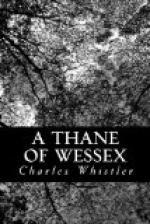I think no man can rightly be held an outlaw who has kept law and has home such as that. For while he has, and loves those, wrong will he do to none.
It was Alswythe who bade me go at last, not for her own sake, but for mine, that I might go on my way to win my fair name back again.
CHAPTER VII. OSRIC THE SHERIFF.
Through the woods I reached Bridgwater town before the sun set, and looking down from the steep hill that overhangs the houses, I could see the market square full of men, shining in arms and armour, and noisy enough, as I could hear. But every one of the townsfolk knew me, and by this time also knew what had befallen me, so that as I stood there it seemed not quite so easy to win a way to the levy as before. The highways were yet full of men coming in, for from where I stood on the edge of the cover I could see the bend of one road, and straight down another. If I went on them I must walk like a leper, alone and shunned by all, with maybe hard words to hear as well.
While I thought of all this, there crept out from among the woods an old crone, doubled up under the weight of a faggot of dry sticks, who stayed to stare at me. I did not mind her, but of a sudden she dropped her bundle of wood, and I saw that it was like to be a heavy task for her to raise it again. So I turned and laid hold of it, for she was but six paces from me, saying:
“Let me help you, Mother, to get it hoisted again. Truly would I carry it for you for a while, but I must bide here.”
“That must you, Heregar the outlaw,” said the old woman coolly, without a word of thanks, and I thought my story and face were better known than I deemed. Therefore I must make the best of it.
“Well, Mother,” said I, “you know me, and if you know me, so also must many others. But I want to join the levy, and fight if need be.”
“Thereby knew I you to be Heregar,” said she; “for none but he must stand here with the light of battle in his eyes and his hand clutched on his sword hilt and not go down to the Cross yonder, as the summons is.”
Then I marvelled at the old dame’s wisdom, though maybe it was but a guess, and asked her what I should do, seeing that she was wise, and the words of such as she are often to be hearkened to.
“It is a wise man,” she answered, “who will take advice; but never a word should you have had from old Gundred, save you had helped her, as a true man should.”
“Truly, Mother Gundred,” I said, “I have no rede of my own, and am minded to take yours.”
“Then, fool,” she said curtly, “link up that tippet of mail across your face, go down to Osric the Sheriff himself, beg to be allowed to fight, and see what he will tell you.”
I had forgotten that I could hook the hanging chain mail of my helmet across, in such manner that little but my eyes could be seen; but then that was never done but in battle—and I had never seen that yet.




